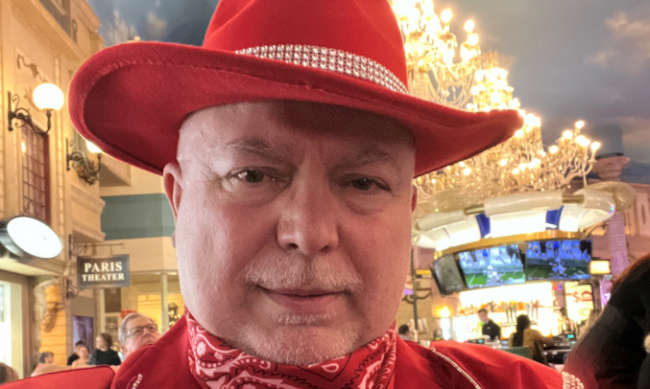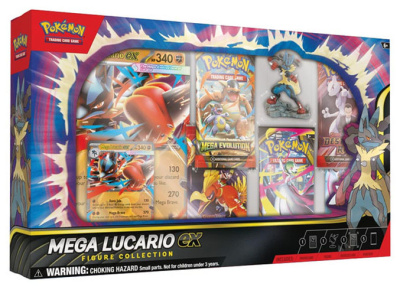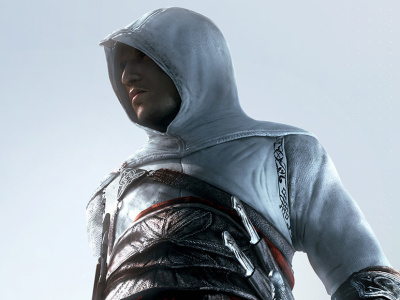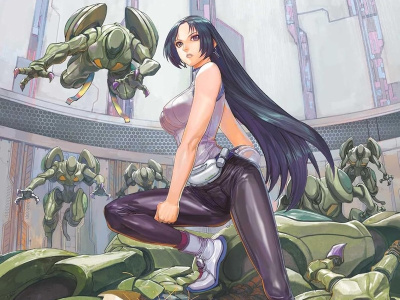ICv2 caught up with Peter Adkison, owner of Gen Con LLC and founder of Wizards of the Coast, for a little game of ICv2 choose your own adventure. We delved deep into three Question Adventure Modules that explore Gen Con LLC, thoughts on Magic: The Gathering, and the games business as a whole.
Today we are talking with Peter Adkison, CEO and owner of GenCon LLC. Peter is of course the founder of Wizards of the Coast, and the guy who helped Dungeons & Dragons roll its critical success on their saving throw versus paralysis back in the 90s. How are you doing today?
Peter Adkison: I'm good. I hate to correct right off the bat, but I'm not CEO of Gen Con anymore. I've retired from having an active role in managing Gen Con. I'm on the board of directors.
I'll note that correction. Before we kicked off this interview, we decided to do this the fun way, which is a little session of ICv2 choose your own adventure. Now, I've seen a lot of interviews with you, and interviewers always seem to lead into them with one particular subject or another. I figured I'd give you the opportunity to choose your own "Question Adventure Module" as we go today.
I know you're a big fan of D&D, and the title of each of these modules is a fantasy-themed adventure allusion to the category of questions. Are you ready for your choices?
I am!
Okay, the first module option is "The Island of the Lotus-eaters." The second module is "Intrigue at the Kings Festival." And, the third one is the "Bazaar of Many Wonders"…
Intrigue at the Kings Festival for $100, Alex!
These are the Gen Con related questions because the "Kings Festival" is Gen Con, at least as far as games go. This question is one of three questions (for the category). Gen Con 2023 had over 70,000 attendees with 530 companies in attendance, and bounced back pretty strong from the COVID-19 pandemic. Everything seems to be kind of back to normal, if not better than 2019. What would you say is the next benchmark for the Gen Con convention?
That's a great question. We're always going to try and inch the attendance number up. But the fact is that, until the new hotel comes in and even then, I don't know that there's really the capacity to keep going up and to the right on a big growth curve. We always want to nudge that number up because if you're not growing then what are you doing? It's good to grow as business, but I think that operational excellence has always been something we care a lot about; technical excellence as well.
The funny thing about the convention business is that it's a big party for all the attendees; everybody comes and has a good time at Gen Con. But for Gen Con, it's also a big logistics challenge for a comparatively little operation. This is really boring stuff, like space planning, registration systems and hotel contracts. That is all at the heart of what running Gen Con is like. I would love to see our company just getting better and better at that, so that the whole badges, events, and everything is just as seamless as possible. That, of course, and more. The other thing that's near and dear to our hearts is diversity, inclusivity, making sure that everybody feels welcome at Gen Con.
Those are definitely good goals. And you know, you do a great job in general (with logistics). Second question about Gen Con: You've become the head of Gen Con TV, and you've been so for a little while. How's that project coming along, and what's coming in 2024 for the channel?
I let go of operating the company about 10 to 12 years ago, and I really started missing being involved, other than just looking over the financials and that sort of thing. So, when David Hoppe (President of Gen Con, LLC.) was somewhat questioning whether or not he wanted to keep doing the Gen Con Twitch channel, I said, "Well, let me do it." I'll just do it as a separate sort of thing; we'll check in with each other and work with all the branding people to make sure we're not making any mistakes on how we present the company. We'll honor of course all the Gen Con code of conduct, but I thought I'd really love to have a piece of Gen Con that I can just do myself and be involved in.
I've been on Gen Con TV a few times at this point, so I know the kind of the excitement that's involved with the channel. You've got some very passionate people working for you.
I don't mean to be too modest by saying we usually get several 100 views on most of our shows, and maybe up to 1000 or sometimes still several thousand as we get closer to Gen Con. To me, it's just really fun to do. There's a couple shows we produce ourselves. There's Table Takes, which is our news show that we do. We curate industry news, other people like you do the hard work.
We also have Actoroke, which is a show we produce ourselves, which is about RPGs. We stream RPGs, and we turn them into movies. I do a show myself, Peter Versus The Machine, where it's just me by myself playing AI strategy games. Most of the shows we have on Gen Con TV are produced by other people; independent producers who want to do a Twitch show, but for whatever reason, don't want the hassle of running a Twitch channel.
Bouncing off your Peter Versus The Machine solo play show concept, we're going to go into a little bonus side quest of the question module here. One of the things ICv2 has been discussing, in-house, revolves around the rise of solo mode games being made available for more and more board games. What do you think about solo (tabletop) gaming, in general? Is (tabletop) gaming becoming more or less social, in your opinion?
Jeffrey, you've known me long enough to know that I grew up, and I cut my teeth in terms of this industry in the 90s. You and I remember that there was a shadow hanging over tabletop games, which was Internet games. There were questions in the 90s, like "Would Internet games devour the world?" and "Would tabletop gaming still be around in the 21st century?" I'm so glad that it is bigger than it's ever been in the past.
The reason [tabletop survived] was very compelling. [The reason is] that some of us always thought [tabletop gaming] was compelling, we were just hoping that we were right in thinking that people liked to get together in person around the table with other people. I'm not dissing solo gaming, it is great. Solo board gaming is like playing a video game in the sense that you're doing it yourself for the enjoyment of trying to figure out a good strategy, honing your skills, and learning the game. But I am now absolutely convinced that there's always going to be a place for people that want to get together and play in person.
Speaking of epic saving throws, we definitely made our saving throw versus MMORPGs in the 00s. The games industry has definitely grown up a lot over the years, and this conversation is a little like exploring a time capsule for me.
We persevered. When we were kids, we were the weirdos. We were the outcasts, the people that were just weird. Geeky people were people that other people make fun of, like in the Nerds movies. This wasn't too long ago in history.
This was a fun side quest, but we have to venture into deeper into other modules at this point. Next up, you have the Island of the Lotus Eaters as an option, and you have the Bazaar of Many Wonders?
Well, let's go to the Island of the Lotus-eaters because I'm curious if that has anything to do with the Black Lotus, Magic or something else?
I wasn't like trying to make the allusions too deep (laughing). Unsurprisingly, that module is about Magic: The Gathering. You still play Magic a little here and there, and you keep tabs on the game. What do you think about the game's current path in the hobby games market?
Well, to be honest, I don't keep that close tabs on Magic. I know that there's been some stress in the market. There were some claims that WotC may have pushed the collector angle too hard; I don't know if they've eased up on that. Maybe there was some production pipeline issues coming out of the pandemic. I'm not sure.
This harkens back to our conversation earlier, about tabletop games and how they survive. Magic is a great game. I tried really hard to screw it up a couple times, and Hasbro certainly feels like they tried to screw it up a couple of times. The game will keep going; how far will depend a little bit on (how they recover from) those mistakes. I do like the tie-ins that they do; I just giggle with the idea of a My Little Pony card set for Magic.
I was one of the first ones to buy that set. I was like "Princess Twilight Sparkle? Are you kidding me? Please, take my money..."
It's fun. I have a funny story on that. Back when we acquired TSR in 1997, as a CEO I said to my board, "What's our rationale for doing this acquisition," asking a lot of tough questions, and one thing I was looking for was a synergy. And I was like, "Well, we're gonna have synergy between Magic and D&D because we can do a D&D-themed Magic expansion. We can do a campaign setting and D&D for Dominaria..." And the board thought that was a great idea, but nobody working in the actual company wanted to do that.
The D&D people didn't want anything to do with Magic. Nobody wanted the brands intermingled; the D&D people liked D&D and the Magic people liked Magic. And so 20 years go by, and just a couple of years ago when they came out with the Magic: The Gathering: Adventures in Forgotten Realms, I emailed all my old board members and said "See! I told you that there would be synergy between these products!"
That's kind of interesting because I remember that era where all these games like Wyvern, Rage, and Highlander CCG showed up.
There were like 100 of them, Jeffrey! There were tons there was even a Sim City trading card game.
There were a lot. And you sort of led into the second part of this question module, which is what are your thoughts on WotC's Universes Beyond line of Magic products, and adding more and more external IPs to Magic cards such as Jurassic Park, Lord of the Rings, and most recently, Fallout?
I think it's great. I wanted to do more of that back in the 90s, and I was a critical minority in that position. The rationale back in the day at WotC was always that we really have to let Magic establish itself as its own thing. We have to have our own story, our own world, intellectual property, etc.
Clearly, by now, Magic has established itself, but I'm not confident that Magic has ever really established a compelling world setting with characters that everybody knows. There's a few people and places that people know, like Urza or Ravnica, but there's not a sense of, "This is the Magic: The Gathering story." I think that it's done well without that, and they've had some ability to license that intellectual property, but not really. I think that adding other intellectual properties to the game, and making it a big sandbox was fine.
I thought for a long time with Wizards of the Coast, back in the day, one of their holy grails was to get Lord of the Rings on Magic cards. Is there any truth to that?
We certainly wanted that license to do a Lord of the Rings trading card game, but we wouldn't in the 90s. At least in my day, we wouldn't have done it as a Magic expansion.
Well done, you've completed question adventure module #2!
Woohoo! I leveled up!
Yes, let's say you've leveled up, and found a Shield of Expression with a big smiley face emoji on it! Onto the final module, "Bazaar of Many Wonders," which contains all the games business questions. It is the 50th anniversary of Dungeons and Dragons, which here at ICv2, we have also marked as the beginning of hobby games as a distribution category. What are your thoughts on the 50-year milestone, and how the business has changed over time and where it's headed next?
I think one thing to celebrate (which is something that has been this way for a while) over the last several decades of tabletop gaming, is that all the categories have been firing on all cylinders. I mean, there's no "Oh my god, are RPGs gonna survive or are miniatures gonna survive?" It's really clear to me that the tabletop game industry is stable on substance. There's always going to be some highs and lows, and some winners and losers, but it's just this is an exciting business in the sense of there's always new hotness and stuff that fades out. I believe that the tabletop gaming category is really strong, has gotten much bigger and it's robust. We just survived the pandemic. I feel really good about that, and that all the categories are going well.
Next question, as we mentioned earlier in the intro, you're the guy that helped D&D make its saving throw versus paralysis in the 90s, and you revived the brand. Last year, D&D kind of failed a DC check with their proposed OGL license changes, which caused a cavalcade of open game licenses to pop up. Do you think more open game license options are a good or bad thing for the RPG industry as a whole?
Well, I don't think they're bad. I think it's probably good for D&D that there's multiple licenses because, to some extent, they'll cannibalize each other. If the entire non-D&D industry got behind one these new licenses and really pushed it, then that would certainly be a credible threat to D&D. But I'm not sure that has happened or will happen. I think that if there are several OGLs out there, and then they reflect different styles of roleplaying, it helps independent content creators create stuff. It's really hard to be to get into this industry and create modules and adventures, guides, or whatever if you can't tie them to a game system that's already out there, and OGLs let you do that.
I think it's really exciting for content creators. People who play these games love lots of content. You and I both probably have more games that we haven't played than games that we have played.
What are your favorite games right now? What are you playing?
If it's role playing, which it often is, it's D&D or Burning Wheel. Those are my two "go to" RPGs, and I think D&D is still great for hack and slash adventuring; an honest heroic adventure where a bunch of us go into the wilderness or into a dungeon to explore, level up, and kill monsters. If it's more of a political intrigue, a social sort of game, or about the ephemeral, then I prefer Burning Wheel. Those are just the RPG options. For board games, it's all over the map.
Moving on, so what is your take on the health of the hobby games market? You see the hobby games market from the convention business lens, do you think we're growing, slowing down, or rolling along at a steady pace?
I think conventions, generally, are growing. I think that it's hard being in the distribution and retail these days because there's so many options for how you get your games. I think it's also tough to be in publishing from the perspective that there are so many publishers, and so many people making games. But overall, the size of the tabletop gaming category is really substantial; the number of people playing games, the number of markets that tabletop gaming has expanded into internationally.
It's a big category, it's just a very crowded category. That says to me that the category’s strong, it's going to be around, but people that are trying to do business in the category are in for a fight and have to really work hard to make a good living at it. And so, it's kind of a mixed news sort of thing. For consumers, though, wow and woohoo! There's lots of stuff out there to play! For publishers, distributors, and retailers, I think you'll be all right, but it's not going to be easy.
That perspective coincides with some of the stuff we've been hearing. So, congratulations! We've completed all the question adventure modules! You've leveled up to, let's say, 11. Or maybe 9? There were 9 questions, so let's go with level 9. Thank you for joining, and we'll play again soon!

Gen Con, 'Magic: The Gathering,' and More!
Posted by Jeffrey Dohm-Sanchez on February 20, 2024 @ 4:27 am CT
MORE GAMES
New Boxed Set
August 22, 2025
The Pokemon Company International will release Pokemon TCG: Mega Lucario ex Figure Collection , a new boxed set, into retail.
Offers Retail Tier
August 22, 2025
Mantic Games' Assassin's Creed: Animus has hit Kickstarter and has a retail rewards tier.
MORE NEWS
Mecha, Mystery, and Martial Arts from Famed Hong Kong Artist
August 22, 2025
Veteran Hong Kong artist Seto mixes martial arts, robots, and a quest for missing scientists in his new graphic novel.
New Paint Markers Feature Speedpaint 2.0 Formula
August 22, 2025
The Army Painter revealed Speedpaint Markers , new paint accessories.








